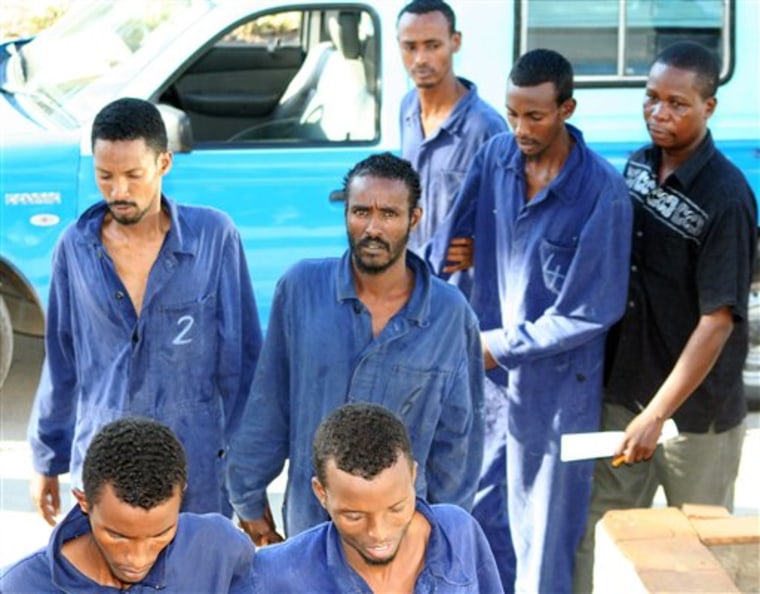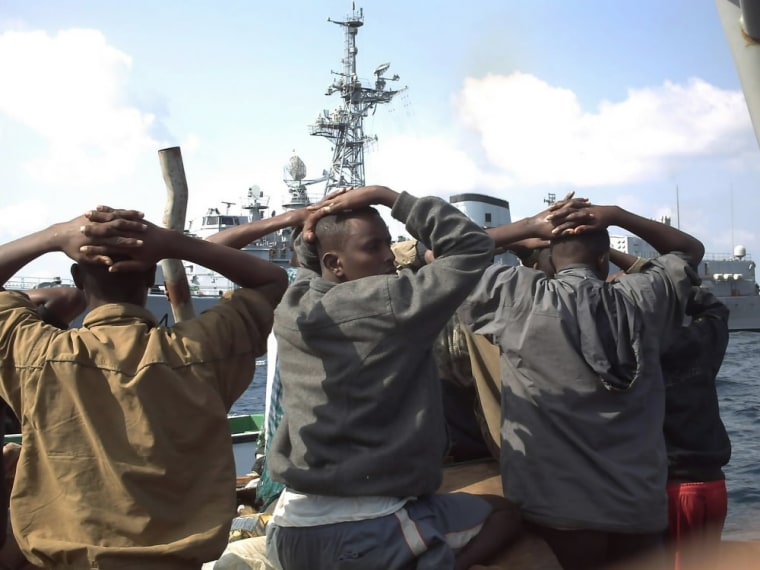Dutch prosecutors are dusting off the oldest international felony in their country's books to tackle the 21st-century wave of piracy.
Five Somali pirates will be tried, likely next month, for the 17th-century offense of "sea robbery." The bandits were captured by the Danish navy in January following a failed attack on a Dutch Antilles-flagged cargo ship off Somalia's lawless coast.
Several more piracy suspects are in French jails awaiting trial. And a pirate who surrendered during Sunday's dramatic rescue of the American captain of the Maersk Alabama will be tried in New York, a U.S. official said.
As the international community grapples with the question of how and where to try captured pirates, the Netherlands and France have led the way by prosecuting them in their own courts. However, other countries are wary of hauling in pirates for trial for fear of being saddled with them after they serve out prison terms.
Several countries are now calling for piracy cases to be prosecuted in the Kenyan port city of Mombasa; there is even talk of setting up a special piracy tribunal there akin to the International Criminal Court in the Hague.
Kenya's foreign ministry confirmed Friday it is studying a proposal to establish a special piracy tribunal.
"You can't follow normal courts' procedure to try pirates," said Mwangi Thuita, the ministry's permanent secretary. "Some witnesses may come from outside the country. So we need to set up some kind of special court to try them."
Thuita said the aim is to "speed up the prosecution and increase the efficiency and transparency of the process of trying pirates."
Who has jurisdiction?
Lack of clarity on jurisdiction can lead to big headaches: The U.S. Navy once had a piracy suspect aboard a ship for seven months largely due to confusion over where he would be prosecuted.
The United States, Britain and European Union have now signed agreements allowing for piracy suspects to be handed over to Kenya for trial.
"Kenya has had a strong tradition of a solid Commonwealth legal system. There is a capacity and certainly they do have an ability (to try piracy cases)," said David Crane, a law professor at Syracuse University. Kenya is part of the Commonwealth of Britain and its former colonies.

In Paris, the French Defense Ministry said Friday that 11 pirates its forces seized in a raid Wednesday hundreds of miles off the Kenyan coast will be turned over to Kenyan authorities.
There are doubts that Kenya — which is still recovering from postelection turmoil in 2007 that left more than 1,000 people dead — would be able to handle the costly and complicated task of trying all or even most cases that emerge from the exploding piracy crisis in the Indian Ocean.
Mark Ellis, executive director of the International Bar Association, said Kenya's courts would need financial and logistical help coping with an influx of piracy cases as the country tries to rebound from its 2007 upheavals.
"Kenya has a number of challenges it is facing as a country and particularly as they affect the judicial system," Ellis said. "I don't think the hurdles are insurmountable, but it will take a much more structured and aggressive approach by the international community to assist Kenya in undertaking this type of trial."
The emphasis on Kenya as a possible host for piracy trials reflects many nations' fear that convicted Somali pirates would stay put after getting out of prison, and possibly their reluctance to get drawn deeper into the increasingly dangerous battle to stamp them out.
Return to sender
Some European nations have even dumped detained pirates back in lawless Somalia, said Pottengal Mukundan, director of the Commercial Crimes Services of the International Maritime Bureau in London.
"I think EU countries are concerned that if the pirates are convicted and spend time in prison, when they finish their sentence they may not be able to send them back to Somalia," Mukundan said.
An international tribunal could be a solution, but few experts believe a costly court could be set up exclusively for pirates.
"In reality it's not politically viable," said Crane, a former U.N. prosecutor who helped set up a special tribunal for Sierra Leone and indicted ousted Liberian President Charles Taylor.
"The trend always has been to deal with it domestically. I would prefer to see it done by regional African states who are being impacted by these pirates."
Preserving the evidence
As for the pirate skiffs themselves, they are usually kept for evidence in potential prosecution. The only time when they are destroyed is when there is insufficient evidence to prosecute but enough suspicious paraphernalia — like ladders, weapons or hooks — to warrant dumping the occupants back on land and destroying the boat.
U.S. involvement in the fight against piracy hit the headlines with the rescue of the captain of the American-flagged Maersk Alabama. Navy sharpshooters killed three pirates holding the ship's captain in a lifeboat while a fourth pirate, Abduhl Wal-i-Musi, surrendered.
On Thursday, a U.S. official said Wal-i-Musi will face trial in New York, where the FBI office has a history of handling cases in Africa involving major crimes against Americans, including the al-Qaida bombings of U.S. embassies in Kenya and Tanzania in 1998. The U.S. official was speaking on condition of anonymity because he was not authorized to disclose information about an ongoing investigation.
Previously the U.S. turned to Kenya in 2006 to try 10 pirates captured by one of its warships. They were convicted and are serving prison sentences in Kenya of seven years each.
21st-century solutions
Washington has not ratified the U.N.-sponsored Law of the Sea, which allows signatories to bring pirates in for trial. But under international law, Wal-i-Musi can be prosecuted in the United States because the Maersk Alabama was flying a U.S. flag and Americans were attacked.
U.S. Secretary of State Hillary Clinton has promised efforts to get the treaty ratified. On Wednesday she unveiled a new strategy to fight pirates that includes attempting to seize their assets.
"These pirates are criminals, they are armed gangs on the sea. And those plotting attacks must be stopped," she said. "We may be dealing with a 17th-century crime, but we need to bring 21st-century solutions to bear."
Crane said the U.S. should seek to have piracy suspects tried locally.
Kenya is "probably the closest and best jurisdiction to do this," he said. "If I were the Obama administration, I would want to see Africans doing something about this."
